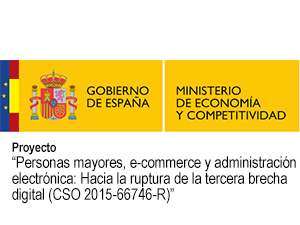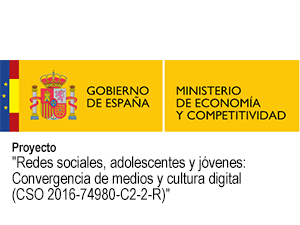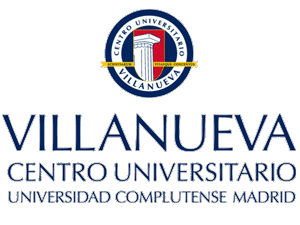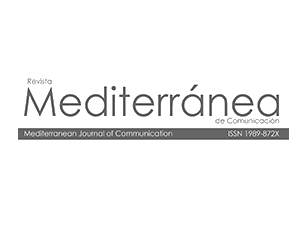Resumen
Cuando en la década de los noventa se dijo que “el hombre antropológico va más despacio que el hombre tecnológico”, no le dimos mucha importancia. Estábamos entretenidos en conocer y asimilar las nuevas herramientas digitales y maravillados con el fascinante mundo que nos abrían.
Pasados más de veinte años, lo cual nos proporciona un históricosobre el impacto de la tecnología sobre el ser humano, esta frase adormecida puede ser el principio de una reflexión sobre el concepto de inclusión (y la consecuente exclusión) en el espacio digital.
Por razones ya conocidas, son nuestros mayores los que más cerca están de un aislamiento aparentemente irreparable pero, a nuestro modo de ver, no tiene las consecuencias tremendistas expuestas cuando el análisis sobre la adhesión a la tecnología está presidido, casi siempre, por criterios económicos.
Partiendo del principio de que la tecnología digital es un medio y no un fin, cabe el cuestionamiento del uso sin miramientos de algunas de sus herramientas. ¿Sería conveniente para una persona mayor cambiar la oportunidad de relacionarse con sus vecinos en la frutería, en la carnicería, en las pequeñas tiendas de su barrio, por el inmediatismo de la compra on-line?
Los verbos utilizados para la inclusión tecnológica (conversión, evolución, cambio), si se malinterpretan,suenan a la renuncia de una cosa por la otra.Pero, ¿sería ventajoso permutar el timo de la estampita por los complejos fraudes en internet? ¿La visita a la Seguridad Social por las gestiones vía telemática?
Por lo tanto, esta comunicación tiene como objetivo discutir desdeuna mirada humanista el impacto y la interferencia del uso impositivo de la tecnología sobre los derechos y libertad de los ciudadanos (sean mayores o no), asícomo su autonomía de la voluntad, su privacidad y el soporte del Estado en sus necesidades administrativas.
Este objetivo, bien entendido, es la convivencia entre todo lo que proporciona la revolución digital con el justo y legítimo derecho a optar por relaciones sociales, comerciales y administrativas sin la intermediación tecnológica.
Con este fin, proponemos las siguientes hipótesis:
- La opción de no usar la tecnología digital (o usarla parcialmente) no conlleva necesariamente un ostracismo social.
- Algunas rutinas del “mundo real” relacionadas con la sociabilidad son benéficas para la salud mental y la convivencia, principalmente entre los mayores.
- La sociedad contemporánea debe mantener los derechos de sus ciudadanos y cumplir la paradoja de estar preparada analógicamente en el siglo XXI.
El procedimiento metodológico será la discusión, basada en referencias bibliográficas, sobre el mundo tecnológico que vivimos frente a los derechos de los seres humanos bajo distintas ópticas como la filosofía, la sociología, la ética y el derecho.
El enfoque inicial de esta comunicación apunta a estas tres conclusiones:
- Es posible la convivencia en distintos niveles con la tecnología digital.
- Que las empresas privadas consideren como un segmento de mercado a aquellos que optan por no adoptar los servicios digitales.
- Que el Estado cumpla su obligación de atender a los mayores analógicos y mantenga sus derechos adquiridos como ciudadanos.
Palabras Clave / Antropologia / Derecho / Inclusión-exclusión / Sociedad digital / Sociología
Abstract
When in the nineties it was said that «anthropological man goes more slowly than technological man», we did not give much importance. We were entertained in knowing and assimilating the new digital tools and amazed with the fascinating world that had been opened to us.
After more than twenty years, which provides us with background information of the impact of technology on the human being, this dormant quote can be the beginning of a reflection on the concept of inclusion (and the consequent exclusion) in the digital space.
For reasons already known, our elders are the closest to an apparently irreparable isolation, but in our view, it does not have the tremendous consequences exposed when the analysis on adherence to technology is almost always led by economic criteria.
Based on the premise that digital technology is a means and not an end, there is the question of the use of some of its tools with no consideration. Would it be convenient for an older person to change the opportunity to socialize with their neighbours at the greengrocer’s, at the bakery, at the small shops of their neighbourhood for the immediacy of online shopping?
The verbs used for technological inclusion (conversion, evolution, change), if misunderstood, sound like giving up one thing to embrace another. But would it have any advantageto swap the lottery ticket scam for the complex frauds on the Internet? Or switch from face-to-face attention in public administrations to on-line procedures?
Therefore, this communication aims to discuss from a humanistic point of viewthe impact and interference of the mandatory use of technology on the rights and freedom of the citizens (whether they are elder or not), such as their autonomy of the will, their privacy and the support of the State in their administrative needs.
This objective, well understood, means the coexistence between everything that provides the digital revolution with the fair and legitimate right to opt for social, commercial and administrative relations without technological involvement.
To this end, we propose the following hypotheses:
- The option of not using digital technology (or using it partially) does not necessarily lead to social ostracism.
- Some «real world» routines related to sociability are beneficial for mental health and coexistence, mainly among the elderly.
- The contemporary society must maintain the rights of its citizens and fulfil the paradox of being prepared analogically in the 21st century.
The methodological procedure will be the discussion, based on bibliographical references on the technological world that we live in versus the rights of human beings from different views such as philosophy, sociology, ethics and law.
The initial approach of this communication points to these three conclusions:
- Coexistence on different levels is possible with digital technology.
- Private companies couldconsider as a market segment those that choose not to embrace to digital services.
- The State should fulfil its obligation to serve the non-tech elders and maintain their acquired rights as citizens.
Keywords / Anthropology / Citizen rights / Digital society / Inclusion-exclusion / Sociology
FIRMANTES
| Nombre | Adscripción | Procedencia |
|---|---|---|
| Jairo Lopes da Silva | investigador independiente | Madrid (España) |
| Paulo Sergio de Oliveira Melo | Centro Universitário FIAM-FAAM-FMU | São Paulo (Brasil) |















